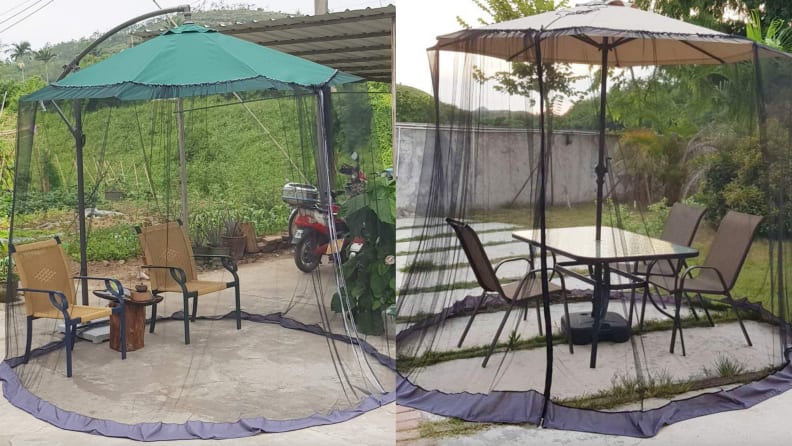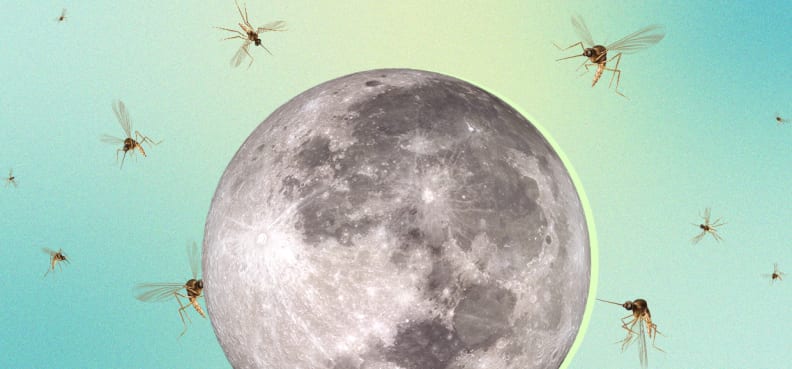Eco-friendly mosquito control tactics that actually work
Here’s the buzz on how to control mosquitoes naturally
Products are chosen independently by our editors. Purchases made through our links may earn us a commission.
After a long winter trapped indoors, there’s nothing better than spending time outside in the sunshine. Whether you’re gardening, dining al fresco, or just relaxing, there’s one thing that can ruin the great outdoors, and that’s being swarmed by mosquitos.
These pesky insects start waking (OK, hatching) from their winter sleep once the thermometer rises above 50°F.
These days many people who seek out mosquito control are also concerned with environmental and health factors. Using strong pesticides to ward off mosquitoes can have unintended consequences, like killing friendlier bugs and pollinators we want to keep in our yards. Not to mention that spraying our bodies with chemicals never feels ideal. (At worst it feels risky to spray chemicals all over us, and at best, we just always feel like we need to shower off ASAP.)
So, how can you mitigate the presence of mosquitoes without dousing your yard and body with chemical pesticides? First off, it helps to nip the problem before the mosquito eggs even start to hatch.
How to prevent mosquitoes from breeding in your yard
Many mosquitoes lay their eggs in the fall and those eggs lay dormant throughout the winter months. The eggs will hatch when they’re triggered by water, like after a good rainfall, or as formerly frozen areas thaw out when the weather turns warmer.
These early-season mosquitos continue to breed and lay eggs throughout the warmer months, seeking out water sources to lay their eggs. This is why many coastal and marshy areas have higher mosquito populations, while more arid areas, like the Southwest, don’t have as much of an issue with these bloodsuckers.
So, if you want to gently tell your uninvited guests they’re not welcome in your yard and home, make sure you don’t have any old flower pots, buckets, gutters, or bird baths containing stagnant water where a mosquito can lay her eggs, and inspect your spigots and hoses for leaks, too.
If your yard is uninviting, you can eliminate the risk that mosquitos will use it as their maternity ward.
If you can’t eliminate all the water from your yard, you may want to try sprinkling mosquito bits in damp areas. These chemical-free pellets contain BTI, or bacillus thuringiensis, naturally occurring spores that produce toxins that target the larvae of mosquitoes, as well as black flies and fungus gnats.
For many of us who are trying to create a hospitable environment for pollinators in our yards, BTI does not affect or inhibit the reproduction of other types of insects like bees.
Get Summit Chemical Mosquito Bits at Amazon for $16.32
4 mosquito control tactics that won’t harm you or the environment
Even with a relatively dry yard, you might still find yourself getting bitten, and that’s because mosquitos love humans. They just want to be close to us! It would be sweet if it wasn’t so annoying. Here are a few tips to help.
1. Don’t let mosquitoes in

Mosquitoes (or any bugs for that matter) don't stand a chance against this defensive mesh netting.
A mosquito net that attaches to an umbrella is a great small-space solution to keep mosquitoes from getting close to you while you’re enjoying your outdoor time. This highly-rated version from Dinhand fits most 7.5-foot to 11-foot patio umbrellas, has a zipper for easy (human) entry, and uses a rope to adjust the size depending on the size of your umbrella. The bottom is also weighted so that the hem won’t fly up in the breeze or allow more tiny visitors inside.
Get the Black Patio Umbrella Mosquito Netting at Amazon for $35.95
2. Blow them away

A creative fix that's guaranteed to keep you feeling cool.
One of the best, and truly chemical-free ways to get mosquitos out of your hair is to use a fan. For the tiny blood suckers, flying through a breeze is like swimming against the current. Not to punch down, but they’re just not the best flyers, so a breeze will literally blow them off course.
Wind will also disperse the carbon dioxide our bodies create, which attracts the bugs to you.
You don’t need to blast your fan on high to do the trick, setting it to low speed will do just fine. Our favorite fan, the Vornado 660, disperses air across entire rooms, making it a great choice to keep these little stinkers at bay.
Get the Vorando 660 at Amazon for $99.99
3. Dress for success

This breathable mesh material will ward off any unnecessary bites and stings.
While you may not want to put on an extra layer of clothing in warmer weather, there are actually quite a few things you can wear (and a few things you should not wear) to prevent bites.
First off, mosquito stingers are strong enough to penetrate thin, loose fabrics like spandex and gauze. Mosquitoes are attracted to our body heat, and dark colors hold in heat more than light, so if you’re headed outside, plan your outfit accordingly.
If you really want to commit to not being bitten, a bug-proof outer layer will create a barrier between you and anything that dares to sink its teeth into you.
Get the Sea to Summit Insect Shield Bug Jacket and Mittens at REI for $36.95
4. Watch the moon

While it may be beautiful to look at, the moon is one of the biggest culprits when it comes to the mosquito population in your yard.
Who knew mosquitoes and werewolves have something in common? They both love a full moon. This may sound wild at first, but keep an eye on the phases of the moon if you really want to avoid getting bitten by mosquitoes. Full moons bring higher tides and wetter land, creating better breeding grounds for mosquitoes, as well as offering them more light to find food.
If your skin is especially sweet, do yourself a favor and stay indoors during the full moon.


